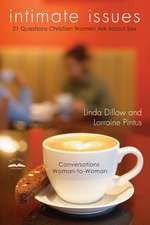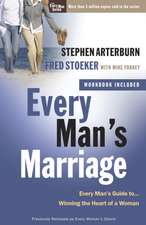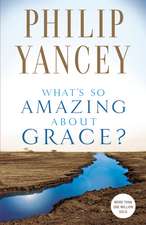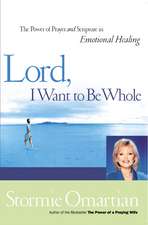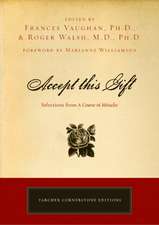Closer Than Your Skin: Unwrapping the Mystery of Intimacy with God
Autor Susan D. Hillen Limba Engleză Paperback – 31 ian 2008
If you sense there’s more to Christianity than service, study, and superficial spirituality…
If you’re ready to go beyond knowing about God
to truly knowing Him…
Here’s where life with God begins.
Is God really like a father who cares about the details of our everyday lives? Then why does He often seem so far away, distant in the moments when we could most use a personal touch from Him?
So many of us have lived in that unspoken longing. In these incredible stories, you’ll see how one person found that God is not always content to wait for us to discover Him amid the clutter of life. Instead, when we simply hold out our hands, He illuminates our ordinary world and gives us new eyes to see.
Closer Than Your Skin traces the journey of an ordinary Christian who longed to move beyond the trappings of faith to genuine life with God. Her story reveals how to overcome the obstacles that most often block such intimate connection. Through this remarkable account, you’ll gain tangible insight into what a daily, vibrant companionship with the Creator really feels like once you wake up to the eternal reality all around you.
Interactive study guide included.
Preț: 90.74 lei
Nou
Puncte Express: 136
Preț estimativ în valută:
17.37€ • 18.06$ • 14.34£
17.37€ • 18.06$ • 14.34£
Carte tipărită la comandă
Livrare economică 12-26 aprilie
Preluare comenzi: 021 569.72.76
Specificații
ISBN-13: 9781400073825
ISBN-10: 1400073820
Pagini: 240
Dimensiuni: 132 x 203 x 15 mm
Greutate: 0.27 kg
Editura: Waterbrook Press
ISBN-10: 1400073820
Pagini: 240
Dimensiuni: 132 x 203 x 15 mm
Greutate: 0.27 kg
Editura: Waterbrook Press
Notă biografică
Susan Hill is an award-winning feature writer and a leader of interdenominational women’s groups, where she frequently hears of the common longing for authentic Christian faith. She also serves on the board of the Uganda Orphans Fund, a non-profit Christian relief organization. Susan and her husband, Duncan, have three children and live in Montana.
Extras
PROLOGUE: Why I Wrote This Book
The biggest human temptation is to settle for too little.
–THOMAS MERTON
In 1985, after seven years of marriage, my husband, Duncan, had become a full-blown alcoholic. Then my world exploded when I discovered he was also having an affair. Pregnant with our second daughter, I was already emotionally volatile. But now, day after day, I secretly wept in the shower of our newly built home that overlooked the Gallatin Valley.
Although Duncan eventually quit drinking, ended the affair, and started attending Alcoholics Anonymous, our marriage remained fragile. Sobriety was tough, but adding a baby to the turmoil stretched our sanity paper thin.
The tension grew unbearable. I felt stung by his betrayal and reacted with hot flashes of anger. I started checking his whereabouts, the phone bill, and his wallet. Trust was shattered, and the deep hole of sorrow sucked me into its gloominess. My wrestling mind asked all the whys and what ifs that follow a loss. In time, I grew weary of the pain. I longed to overcome my emotions and return to some semblance of normalcy.
Duncan experienced increasing hopelessness about his life as well. He’d tried counseling and treatment programs. He faithfully attended AA meetings and worked the twelve steps with a sponsor. But he didn’t feel better.
Finally, one average weekday morning turned into an unforgettable day. Duncan came downstairs in his stockbroker suit and tie, ready for another eight hours of high-energy appointments and urgent phone calls.
He entered the kitchen to say good-bye, his neatly combed hair still wet from the shower. We exchanged a perfunctory kiss on the cheek, and he drove off in his pickup. But less than a mile from home, overwhelming despair forced him to pull over. Later, he explained what happened.
The motor idled, but his thoughts raced. On a hillside with a bird’seye view of our town, he took account…my wife, the kids, a brand-new house, nice cars, recreation whenever I want, and plenty of money…why am I so unhappy? I don’t drink anymore. The affair is over. So why don’t I feel better? I’ve made such a mess of things with Susan. He looked out the windshield at the beautiful valley on a spring morning. I don’t even enjoy this. Everything is ruined. What’s the use? As hard as he tried, he couldn’t shake the feeling of futility. It was the darkest void he’d ever been in.
Now he understood why people shot themselves. In agony he yelled, “God help me! God! Please help me,” and stretched out his palms in the cab of his truck, reaching for something unseen.
A calming, powerful presence entered the truck and surrounded him. The presence was magnificent and stunning, yet somehow as real as anything, and even intimate. He knew instantly that it was God. There was no denying it. A serene voice inside his head said, Everything is going to be okay. He sensed God telling him that recovery and healing would take time. A perceptible peace flowed over him like soothing water, and his anguish subsided.
Later that day when we met with our counselor at an alcohol treatment program, Duncan felt the same presence come into the room, as intense as it had been before. As the counselor spoke, Duncan wept a stream of tears. I’m not exactly sure what was said, but it was all about Jesus, and in those moments, my husband became a follower of Christ.
A heavenly transaction had taken place, and nothing else mattered. Duncan is a passionate person, and his experience of God was no different. His primordial cry wouldn’t have been satisfied with a pastoral platitude. He needed nothing short of an authentic encounter with the God who knew his deepest need. And from that day on, he understood that God was profoundly relational.
From the beginning, he didn’t worry about regular church attendance or maintaining a perfect-behavior scorecard. He wasn’t compelled to earn a degree in systematic theology. And although helping orphans has become his life’s work, he didn’t initially run out and start programs for the poor. His initial and lasting expression of faith was a hunger and thirst to know the God who had visited him in his truck. This alone brought deep satisfaction. With guitar in hand, he spent many early mornings singing to his newfound love.
It was just the beginning, but he’d encountered something authentic, and he knew it.
In stark contrast, I grew up in a churched family, but the idea of having a relationship with God was little more than Christian rhetoric.
I knew God existed in a general, transcendental sort of way, but I didn’t know I was missing something. I wasn’t hungry or thirsty for anything.
My spiritual experience was all coloring inside the lines. One day Duncan said, “If you don’t have a living, moving, breathing relationship with God, you have nothing.” I nodded, agreeing theoretically but wondering, What does that really mean? Relationship implied connection, contact. Sure it had happened to him, but was that possible for me? Talking to other Christians, I realized my queries were not unique. Everywhere I raised the question, others seemed to share my ignorance. If I mentioned the idea of hearing God’s voice or connecting with him in a real way, I’d get the fisheye, or at best, pensive stares. If you actually believe God can speak to people, you risk getting put in the category of crackpots and fanatics.
Actual contact sounds far-fetched, ludicrous, and presumptuous. People envision Jim Jones the Kool-Aid leader, David Koresh, and glassy-eyed smiley people.
Nevertheless, as I looked in my Bible, it was hard to miss that God got up close and personal with more than a few people. Moses and Abraham, for instance. But of course, they were uniquely chosen by God. Maybe I was just a twentieth-century housewife with an overactive imagination. He’d spoken to my husband, but I had been raised in the church and was reluctant to believe in spiritual hocus-pocus. Call it what you will, but I was loyal to the Way-We’ve-Always-Done-Things type of church.
Then one summer, I decided to study the book of Acts. To my surprise, I found a living, moving, breathing kind of God. The Holy Spirit supernaturally interacted with those first followers as they started building the kingdom of heaven on earth. Something stirred me.
I wanted that. I longed for real contact with God. Living in a different time, under different circumstances, shouldn’t exclude me from that sort of relationship. I didn’t buy “that was then; this is now.” Yet when I looked at all our Christian literature, tapes, sermons, college curricula, and camp programs, the relational aspect of our faith seemed sorely underdeveloped. We give it lip service, telling others our faith is not a religion but a relationship with God, yet we fail to unpack the cliché. True seekers are left hanging. People yearn for a genuine connection with God to the point where they accept substitute gods they can see and touch.
It’s nothing new. The Israelites grew tired of waiting for Moses’s God and had a golden cow. Lacking the hope of something more tangible and satisfying, are we any different? If Christianity is a story about restoring relationship with God, there must be more to it.
I didn’t set out to write a technical how-to manual on experiencing God. Neither is this a theological case for hearing God’s voice today. Other authors have ably laid that foundation.1 I don’t pretend to be an authority. These are just some notes I’ve taken along the way. My hope is that through them you might find something beyond the familiar and the formulaic, and see the possibilities for knowing God yourself. What you’re about to read is how I discovered that God was interacting with me all throughout my life, beginning in my childhood. As I grew up, several obstacles kept me from knowing him. These were gradually overcome. Then I learned to slow down, listen, wait, and notice things that were more than simple coincidence. Hearing God’s voice was like learning a new language. I started with the basics and gradually picked up more nuances.
The Bible says, “God speaks once, or twice, yet no one notices it.” Most people have no template for intimacy with him, yet it isn’t enough to simply believe in God. You need more than a religious paradigm. You have to experience him.
I found that God not only spoke in the crises but also in the mundane events of my life. Soon intimacy with God was no longer a myth. He was available, responsive, and interested in making contact. I only had to ask and believe it was possible in the first place. After all, God himself said:
And you will seek Me and find Me, when you search for Me with all your heart. And I will be found by you.
God is knowable.
The biggest human temptation is to settle for too little.
–THOMAS MERTON
In 1985, after seven years of marriage, my husband, Duncan, had become a full-blown alcoholic. Then my world exploded when I discovered he was also having an affair. Pregnant with our second daughter, I was already emotionally volatile. But now, day after day, I secretly wept in the shower of our newly built home that overlooked the Gallatin Valley.
Although Duncan eventually quit drinking, ended the affair, and started attending Alcoholics Anonymous, our marriage remained fragile. Sobriety was tough, but adding a baby to the turmoil stretched our sanity paper thin.
The tension grew unbearable. I felt stung by his betrayal and reacted with hot flashes of anger. I started checking his whereabouts, the phone bill, and his wallet. Trust was shattered, and the deep hole of sorrow sucked me into its gloominess. My wrestling mind asked all the whys and what ifs that follow a loss. In time, I grew weary of the pain. I longed to overcome my emotions and return to some semblance of normalcy.
Duncan experienced increasing hopelessness about his life as well. He’d tried counseling and treatment programs. He faithfully attended AA meetings and worked the twelve steps with a sponsor. But he didn’t feel better.
Finally, one average weekday morning turned into an unforgettable day. Duncan came downstairs in his stockbroker suit and tie, ready for another eight hours of high-energy appointments and urgent phone calls.
He entered the kitchen to say good-bye, his neatly combed hair still wet from the shower. We exchanged a perfunctory kiss on the cheek, and he drove off in his pickup. But less than a mile from home, overwhelming despair forced him to pull over. Later, he explained what happened.
The motor idled, but his thoughts raced. On a hillside with a bird’seye view of our town, he took account…my wife, the kids, a brand-new house, nice cars, recreation whenever I want, and plenty of money…why am I so unhappy? I don’t drink anymore. The affair is over. So why don’t I feel better? I’ve made such a mess of things with Susan. He looked out the windshield at the beautiful valley on a spring morning. I don’t even enjoy this. Everything is ruined. What’s the use? As hard as he tried, he couldn’t shake the feeling of futility. It was the darkest void he’d ever been in.
Now he understood why people shot themselves. In agony he yelled, “God help me! God! Please help me,” and stretched out his palms in the cab of his truck, reaching for something unseen.
A calming, powerful presence entered the truck and surrounded him. The presence was magnificent and stunning, yet somehow as real as anything, and even intimate. He knew instantly that it was God. There was no denying it. A serene voice inside his head said, Everything is going to be okay. He sensed God telling him that recovery and healing would take time. A perceptible peace flowed over him like soothing water, and his anguish subsided.
Later that day when we met with our counselor at an alcohol treatment program, Duncan felt the same presence come into the room, as intense as it had been before. As the counselor spoke, Duncan wept a stream of tears. I’m not exactly sure what was said, but it was all about Jesus, and in those moments, my husband became a follower of Christ.
A heavenly transaction had taken place, and nothing else mattered. Duncan is a passionate person, and his experience of God was no different. His primordial cry wouldn’t have been satisfied with a pastoral platitude. He needed nothing short of an authentic encounter with the God who knew his deepest need. And from that day on, he understood that God was profoundly relational.
From the beginning, he didn’t worry about regular church attendance or maintaining a perfect-behavior scorecard. He wasn’t compelled to earn a degree in systematic theology. And although helping orphans has become his life’s work, he didn’t initially run out and start programs for the poor. His initial and lasting expression of faith was a hunger and thirst to know the God who had visited him in his truck. This alone brought deep satisfaction. With guitar in hand, he spent many early mornings singing to his newfound love.
It was just the beginning, but he’d encountered something authentic, and he knew it.
In stark contrast, I grew up in a churched family, but the idea of having a relationship with God was little more than Christian rhetoric.
I knew God existed in a general, transcendental sort of way, but I didn’t know I was missing something. I wasn’t hungry or thirsty for anything.
My spiritual experience was all coloring inside the lines. One day Duncan said, “If you don’t have a living, moving, breathing relationship with God, you have nothing.” I nodded, agreeing theoretically but wondering, What does that really mean? Relationship implied connection, contact. Sure it had happened to him, but was that possible for me? Talking to other Christians, I realized my queries were not unique. Everywhere I raised the question, others seemed to share my ignorance. If I mentioned the idea of hearing God’s voice or connecting with him in a real way, I’d get the fisheye, or at best, pensive stares. If you actually believe God can speak to people, you risk getting put in the category of crackpots and fanatics.
Actual contact sounds far-fetched, ludicrous, and presumptuous. People envision Jim Jones the Kool-Aid leader, David Koresh, and glassy-eyed smiley people.
Nevertheless, as I looked in my Bible, it was hard to miss that God got up close and personal with more than a few people. Moses and Abraham, for instance. But of course, they were uniquely chosen by God. Maybe I was just a twentieth-century housewife with an overactive imagination. He’d spoken to my husband, but I had been raised in the church and was reluctant to believe in spiritual hocus-pocus. Call it what you will, but I was loyal to the Way-We’ve-Always-Done-Things type of church.
Then one summer, I decided to study the book of Acts. To my surprise, I found a living, moving, breathing kind of God. The Holy Spirit supernaturally interacted with those first followers as they started building the kingdom of heaven on earth. Something stirred me.
I wanted that. I longed for real contact with God. Living in a different time, under different circumstances, shouldn’t exclude me from that sort of relationship. I didn’t buy “that was then; this is now.” Yet when I looked at all our Christian literature, tapes, sermons, college curricula, and camp programs, the relational aspect of our faith seemed sorely underdeveloped. We give it lip service, telling others our faith is not a religion but a relationship with God, yet we fail to unpack the cliché. True seekers are left hanging. People yearn for a genuine connection with God to the point where they accept substitute gods they can see and touch.
It’s nothing new. The Israelites grew tired of waiting for Moses’s God and had a golden cow. Lacking the hope of something more tangible and satisfying, are we any different? If Christianity is a story about restoring relationship with God, there must be more to it.
I didn’t set out to write a technical how-to manual on experiencing God. Neither is this a theological case for hearing God’s voice today. Other authors have ably laid that foundation.1 I don’t pretend to be an authority. These are just some notes I’ve taken along the way. My hope is that through them you might find something beyond the familiar and the formulaic, and see the possibilities for knowing God yourself. What you’re about to read is how I discovered that God was interacting with me all throughout my life, beginning in my childhood. As I grew up, several obstacles kept me from knowing him. These were gradually overcome. Then I learned to slow down, listen, wait, and notice things that were more than simple coincidence. Hearing God’s voice was like learning a new language. I started with the basics and gradually picked up more nuances.
The Bible says, “God speaks once, or twice, yet no one notices it.” Most people have no template for intimacy with him, yet it isn’t enough to simply believe in God. You need more than a religious paradigm. You have to experience him.
I found that God not only spoke in the crises but also in the mundane events of my life. Soon intimacy with God was no longer a myth. He was available, responsive, and interested in making contact. I only had to ask and believe it was possible in the first place. After all, God himself said:
And you will seek Me and find Me, when you search for Me with all your heart. And I will be found by you.
God is knowable.
Recenzii
Praise for Closer Than Your Skin
“Warning: Susan Hill has written a deceptive book. It looks like another woman-with-a-fragile-marriage-struggles-in-her-relationship-with-God book. Yet her life and spiritual experiences become compellingly honest and transparent.”
–Cecil Murphey, co-author of 90 Minutes in Heaven, Heaven Is Real, and more than 100 other books.
“Over the last sixty years I have read numerous works on Christian spirituality. But I must say that Susan Hill has made the best case I’ve ever read for intimacy with God. It is biblically sound, psychologically real and personally honest. I’ve never heard any theologian or Bible teacher portray the true intimacy with God as Jesus promises in the relation of the branch and the vine (John 15:1-9) as powerfully as Susan does. I think this is the book that millions of Christians have been waiting for!”
—James W. Tharp, founder and president of Christian Renewal Ministries and author of Revival Must Come! and The Spirit of Prayer.
“Susan’s book will lead the reader on an interesting journey of discovery and clarification. She is right about life with God being adventurous and breath-taking. Writing with a vulnerability that allows the light of God’s grace to shine through real life situations, she presents God’s way as both beneficial and desirable. She leads us through her ideas with anticipation. It will help people clarify the real issue of living with God. I read it for interest and edification and I was not disappointed.”
–Dudley Hall, founder and president of Successful Christian Living Ministries
“Some books argue that God exists. This book gives us His address. Some books tell us about Him, this book shows us what He looks like. If you’ve ever wondered if there’s more to the Christian life, Susan Hill doesn’t just assure us that there is, she hands us a roadmap, and shows us how to get there.”
–Phil Callaway, popular speaker and bestselling author
“As a Christian, my journey with God often seems more like working for a demanding employer than walking hand in hand with my first love. Susan Hill’s book was a refreshing reminder that it is the latter and not the former that the Lord desires of me. Her stories take you to the feet of the Father of Love to encounter for yourself His incredible kindness. I hope as you read this book you too can discover why the ‘nearness of God is our good.’ (Psalm 73:28)”
–Jimmy Needham, recording artist, Inpop Records
“Warning: Susan Hill has written a deceptive book. It looks like another woman-with-a-fragile-marriage-struggles-in-her-relationship-with-God book. Yet her life and spiritual experiences become compellingly honest and transparent.”
–Cecil Murphey, co-author of 90 Minutes in Heaven, Heaven Is Real, and more than 100 other books.
“Over the last sixty years I have read numerous works on Christian spirituality. But I must say that Susan Hill has made the best case I’ve ever read for intimacy with God. It is biblically sound, psychologically real and personally honest. I’ve never heard any theologian or Bible teacher portray the true intimacy with God as Jesus promises in the relation of the branch and the vine (John 15:1-9) as powerfully as Susan does. I think this is the book that millions of Christians have been waiting for!”
—James W. Tharp, founder and president of Christian Renewal Ministries and author of Revival Must Come! and The Spirit of Prayer.
“Susan’s book will lead the reader on an interesting journey of discovery and clarification. She is right about life with God being adventurous and breath-taking. Writing with a vulnerability that allows the light of God’s grace to shine through real life situations, she presents God’s way as both beneficial and desirable. She leads us through her ideas with anticipation. It will help people clarify the real issue of living with God. I read it for interest and edification and I was not disappointed.”
–Dudley Hall, founder and president of Successful Christian Living Ministries
“Some books argue that God exists. This book gives us His address. Some books tell us about Him, this book shows us what He looks like. If you’ve ever wondered if there’s more to the Christian life, Susan Hill doesn’t just assure us that there is, she hands us a roadmap, and shows us how to get there.”
–Phil Callaway, popular speaker and bestselling author
“As a Christian, my journey with God often seems more like working for a demanding employer than walking hand in hand with my first love. Susan Hill’s book was a refreshing reminder that it is the latter and not the former that the Lord desires of me. Her stories take you to the feet of the Father of Love to encounter for yourself His incredible kindness. I hope as you read this book you too can discover why the ‘nearness of God is our good.’ (Psalm 73:28)”
–Jimmy Needham, recording artist, Inpop Records
Descriere
These incredible stories trace the journey of an ordinary Christian who longed to move beyond the trappings of faith to genuine life with God. Her story reveals how to overcome the obstacles that most often block such intimate connection.


